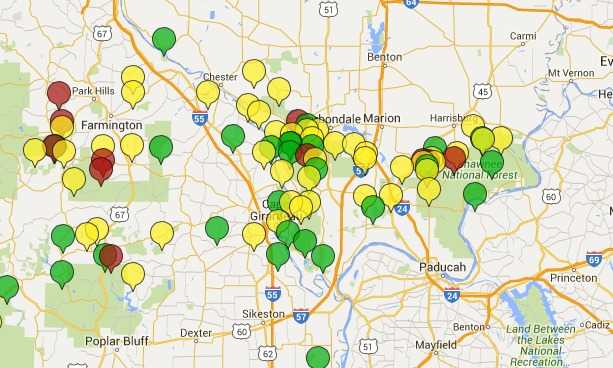
Pavement Ends
James Baughn was the webmaster of seMissourian.com and its sister newspapers for 20 years. On the side, he maintained even more sites, including Bridgehunter.com, LandmarkHunter.com, TheCapeRock.com, and Humorix. Baughn passed away in 2020 while doing one of the things he loved most: hiking in Southeast Missouri. Here is an archive of his writing about hiking and nature in our area.
More than you ever wanted to know about the Missouri legislature's interest in Fruitland
Posted Thursday, July 11, 2013, at 10:00 AM
Last year, I wrote a "not-so-brief history of Fruitland" describing the rich history of that part of Cape Girardeau County.
At the time I wrote that blog, Jackson was on the verge of extending the tentacles of its city limits into Fruitland. I warned, "Now that Jackson is attempting to annex a portion of Fruitland, let's hope that Fruitland's identity and history aren't lost in the shuffle."
That concern is still valid today, especially with the revelation that the Missouri legislature has taken an unusual interest in Fruitland. After a careful study of the House journals for the 2013 session, I've found more than one piece of legislation connected to Fruitland.
Here, for your reading pleasure, is the timeline of events. I've analyzed the legislature's tedious reports so you don't have to:
April 23, 2013
In the first of many such attempts, Rep. Dave Schatz of Sullivan offered an amendment to a separate bill, House Bill 881, that specifically targeted Cape Girardeau County, but not by name. The amendment stated:
"The provisions of section 444.771 shall not apply to any business entity located in any county of the first classification with more than seventy thousand but fewer than eighty-three thousand inhabitants and with a city of the fourth classification with more than thirteen thousand five hundred but fewer than sixteen thousand inhabitants as the county seat."
Good luck trying to untangle this hot mess of legalese. In 2011, supporters of Saxony Lutheran High School in Fruitland pushed for a law that prohibited quarries from operating within 1,000 feet of an established school. This bill became law as "Section 444.771."
So, in plain English, the quarries at Fruitland would no longer need to stay 1,000 feet away from the school, an advantage that no other quarry in Missouri would enjoy. The Schatz amendment would effectively undo the purpose of the original law, but in a non-obvious way.
(Source: House Journal, Day 56, p. 1465)
May 1
Rep. Chuck Gatschenberger of Lake St. Louis offered an amendment to Senate Bill 23 that seems to be a direct response to a recent lawsuit that Fruitland residents won against Jackson.
In 2009, Jackson annexed Highway 61 and Interstate 55 toward Fruitland. Later, Jackson tried to use these annexation tentacles as a stepping stone to annex the Fruitland quarries, but this attempt was rejected by voters.
Then, Fruitland landowners successfully challenged the original highway annexation. They argued that the annexation was not "compact and contiguous" as required by Missouri law, and Judge William Syler agreed, ruling that Jackson's action was "illegal, invalid and void." His order was blunt: "The Respondent, City of Jackson, is hereby ousted from these roadways..."
Gatschenberger's amendment tackled two issues that were argued in the lawsuit. First, while the Missouri Department of Transportation had granted Jackson permission to annex its roadways, the lawsuit contended that MoDOT didn't follow proper procedures in "verifying" its petition for voluntary annexation. The amendment would eliminate this argument from future cases: "That a petition requesting annexation is not or was not verified or notarized shall not affect the validity of an annexation."
Second, considerable time had passed since the annexation went into effect. In a response to the lawsuit, Jackson argued, among other things, that the plaintiffs had waited too long. While Missouri law does not give a specific time limit for challenging illegal annexations, Gatschenberger's legislation would impose a three-year limit.
If this amendment had been in effect earlier, Fruitland's lawsuit would not have been possible.
(Source: House Journal, Day 61, p. 1825)
May 7
Rep. Schatz tried a second time to slip his Cape County quarry exemption amendment into an unrelated bill, this time Senate Bill 9.
(Source: House Journal, Day 64, p. 2038)
May 8
Both the Gatschenberger and Schatz amendments are offered to the same bill, Senate Bill 41. First, Gatschenberger attached his annexation proposal as Amendment No. 1, and then Schatz added his own pet issue as Amendment No. 3. Two representatives raised objections to the Schatz amendment, but they were overruled.
The underlying bill, sponsored by Sen. Brian Munzlinger of Lewis County, would make it harder for private interests to file lawsuits against businesses over issues of water or air quality. Munzlinger had pushed for this legislation in 2011 and 2012. A news story from last year made it clear that he was concerned mostly with confined animal feeding operations, but he did explicitly state that his proposal would also apply to quarries.
Since opponents of the Fruitland quarries have obviously not been shy about litigation, the Munzlinger bill would be quite convenient for quarry operators if they were to have any pollution mishaps in the future.
With the Gatschenberger and Schatz amendments in place, the entire Senate Bill 41 -- if passed -- would represent a grand slam for the quarries.
(Source: House Journal, Day 65, p. 2203 and 2246)
May 13
Gatschenberger offered his annexation amendment yet again, this time to Senate Bill 58.
(Source: House Journal, Day 67, p. 2362)
May 15
In tenacious fashion, Gatschenberger introduced his amendment to another sprawling piece of legislation, Senate Bill 83. This bill featured an all-encompassing title, "Modifies provisions of law relating to political subdivisions, traffic offenses and taxation." Immediately after he offered his amendment -- the last of 37 amendments -- the bill went down in defeat under its sheer weight.
Meanwhile, Schatz added his Cape County bill into an unrelated agriculture bill, Senate Bill 342.
(Source: House Journal, Day 69, p. 2787 and 2801)
May 16
Another sprawling act, Senate Bill 24, became the target for both the Schatz and Gatschenberger proposals again. This time, Gatschenberger loosened his three-year limit into a five-year limit for challenging illegal annexations. However, this bloated bill doesn't go very far.
(Source: House Journal, Day 70, p. 2887 and 2991)
May 17
Senate Bill 41, the trifecta of Fruitland efforts, failed.
However, it's still a good day for Schatz as his Cape County amendment passed the legislature via Senate Bill 342.
(Source: Senate Bill 342 actions)
May 22
Gatschenberger also scored a victory as his amendment is delivered to the governor via Senate Bill 58.
(Source: Sebate Bill 58 actions)
June 28
The Gatschenberger annexation bill is signed into law by the governor.
July 2
Schatz's quarry law, however, does not fare as well. Gov. Jay Nixon vetoed Senate Bill 342 for a variety of reasons, one of which is an objection to making a special case for Cape Girardeau County. He issued this statement:
"It is generally objectionable to exclude a select industry or company from an existing standard to which all other like entities are held. It is even more offensive to suggest that school children in Cape Girardeau County should receive any less protection than children in all other parts of the state."
The end result
Thanks to Rep. Chuck Gatschenberger, it's now somewhat harder to challenge cities that engage in illegal annexations. Judging by the maps of the weird shapes of both the Cape Girardeau and Jackson city limits that are clearly not compact, this is no small matter.
Rep. Dave Schatz, for reasons unknown at this point, tried to give a huge boost to the quarries at Fruitland. That bill was vetoed, but it could appear again, either in a veto override attempt or some crafty legislation introduced in the 2014 session.
Sen. Brian Munzlinger keeps trying to push a bill to make it harder to sue businesses over pollution. It didn't go anywhere this year, but it will likely reappear again.


Respond to this blog
Posting a comment requires a subscription.